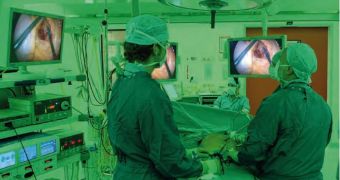Investigators from TU Delft say that it is now possible to conduct virtual simulations of keyhole surgeries, a capability that will ensure surgeons are better prepared to conduct such procedures.
Keyhole surgery is very complex to perform in any case, and involves the use of complex technologies. Those performing the procedures need to have a handle on both theoretical knowledge and on the technical aspects of the machines involved.
The new simulations promise to provide both of these factors, the team says. They will be presented by PhD candidate Sonja Buzink in a paper due for presentation on September 7.
The expert says that the main reason this technology appeared was because patient safety could still be improved. There is also still room for improvement in physicians' training.
This can be achieved by using virtual simulators, Buznik thinks. Also, this training method ensures that the performance of surgeons is rated in an objective, verifiable manner,
“Patient safety in the operating theater could also be improved by making slight adjustments to how the instruments and apparatus that facilitate image-based procedures are used,” Buzink thinks.
Keyhole surgery involves only a handful of small cuts in the patient's skin. A thin video camera is then introduced through one of these openings, and the procedure is then conducted without a clear view of the area being addressed.
This requires tremendous amount of hand-to-eye coordination for surgeons, who need to develop an extra set of skills, in addition to learning all the data pertaining to their profession alone.
With the aid of the “Surgeon’s Cockpit” project, experts could become better trained in conducting laparoscopic surgery. Another advantage is that communications within the surgery team is improved.
This means that patients will be subjected to lower risks of equipment malfunctions or human errors. The trials Buznik conducted showed that surgeons' performances improved significantly after using the virtual simulations.
“Training and assessment of image-based skills should […] be done for each type of task separately,” explains Buzink.
The Surgeon's Cockpit is a larger project, in which researchers at the universities and medical centers in Leiden and Rotterdam are also involved.

 14 DAY TRIAL //
14 DAY TRIAL //